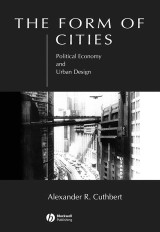Details

The Form of Cities
Political Economy and Urban Design1. Aufl.
|
41,99 € |
|
| Verlag: | Wiley-Blackwell |
| Format: | |
| Veröffentl.: | 15.04.2008 |
| ISBN/EAN: | 9780470777527 |
| Sprache: | englisch |
| Anzahl Seiten: | 324 |
DRM-geschütztes eBook, Sie benötigen z.B. Adobe Digital Editions und eine Adobe ID zum Lesen.
Beschreibungen
<p><b><i>The Form of Cities</i> offers readers a considered theoretical introduction to the art of designing cities.</b></p> <ul> <li>Demonstrates that cities are replete with symbolic values, collective memory, association and conflict.</li> <li>Proposes a new theoretical understanding of urban design, based in political economy.</li> <li>Demonstrates different ways of conceptualising the city, whether through aesthetics or the prism of gender, for example.</li> <li>Written in an engaging and jargon-free style, but retains a sophisticated interpretative edge.</li> <li>Complements <i>Designing Cities</i> by the same author (Blackwell, 2003).</li> </ul>
List of Figures List of Tables. <p>Preface.</p> <p>Acknowledgements.</p> <p>Introduction.</p> <p><b>1. Theory</b>.</p> <p>Introduction: The Problem.</p> <p>Urban Design: Definitions.</p> <p>Urban Design: ‘Theory’.</p> <p>Spatial Political Economy and Urban Design.</p> <p><b>2. History</b>.</p> <p>Introduction: What is History?.</p> <p>History and Urban Design.</p> <p>Chronologies.</p> <p>Typologies.</p> <p>Utopias.</p> <p>Fragments.</p> <p>Materialist Theory Overview.</p> <p><b>3. Philosophy</b>.</p> <p>Introduction: Implications from Philosophy.</p> <p>Philosophy and Urbanism Paradigms.</p> <p>Philosophy and Urban Design <b>4. Politics</b>.</p> <p>Introduction: Politics and Ideology.</p> <p>Power: Rights and Laws Law as Ideology.</p> <p>Politics and Urban Planning.</p> <p>The Public Realm.</p> <p><b>5. Culture</b>.</p> <p>Introduction: Culture and Urban Design.</p> <p>The Culture of Modernism.</p> <p>Postmodern Culture.</p> <p>Globalisation, Culture, Economy.</p> <p>Authenticity and Symbolic Representation.</p> <p>The New Ruralism/Urbanism.</p> <p><b>6. Gender</b>.</p> <p>Introduction: Gender the Missing Component.</p> <p>Gender and Society Gender and Patriarchy.</p> <p>Gender and Capital.</p> <p>Gender and Space.</p> <p>Gender and Urban Design.</p> <p><b>7. Environment.</b></p> <p>Introduction: Nature and the City.</p> <p>Origins and Development.</p> <p>People-Nature.</p> <p>Sustainability and Development.</p> <p>Sustainable Cities.</p> <p>Sustainable Urban Design.</p> <p><b>8. Aesthetics</b>.</p> <p>Introduction: Aesthetics – Objects and Experience.</p> <p>The Aesthetics of Urban Form.</p> <p>Mathematics and the Divine Order.</p> <p>Contextualism.</p> <p>Rationalism.</p> <p>Symbolic Capital.</p> <p>Regulation.</p> <p>Theming.</p> <p><b>9. Typologies</b>.</p> <p>Introduction: Taxonomy, Typology, Morphology, System.</p> <p>Typologies Derived from Associated Disciplines.</p> <p>Typologies Derived from Traditional Urban Design Perspectives.</p> <p>Implications from Spatial Political Economy.</p> <p><b>10. Pragmatics</b>.</p> <p>Introduction: Cultural Capital.</p> <p>Professional Intervention.</p> <p>Professions and Knowledge Systems.</p> <p>Professions and Space.</p> <p>Urban Design Education Postscript.</p> <p>References.</p> <p>Index</p>
‘<i>The Form of Cities</i> is an important critique and synthesis of recent thinking about urban design … a powerful analysis of the emergence, logic, and political meaning of the built environment in given historical contexts.’ <i>Allen J. Scott, Distinguished Professor of Public Policy and Geography, UCLA</i><br /> <p><br /> </p> <p>‘A major achievement in the radical spirit of Manuel Castells’ and Mike Davis’ writings. Cuthbert repositions urban design theory … to reveal the bedrock systems of material and symbolic production shaping modern cities.’ <i>Chris Abel, Architectural critic and author of Architecture, Technology, Process and Architecture and Identity</i><br /> </p> <p><br /> </p> <p>‘Truly an impressive piece of work. … This book will become seminal not only for urban design students and practitioners, and those engaged in the study and practice of urban policy-making and planning, but also for students of urban geography and political science.’ <i>Harry T. Dimitriou, Bartlett Professor of Planning Studies, UCL</i><br /> </p> <p>"[Cuthbert] sets out not only to make the professional case for urban design but also the disciplinary case. What ensues is an immense and far-reaching catalog of ideas that in many ways is a tour de force."<br /> <i>Journal of Regional Science</i></p>
<b>Alexander R. Cuthbert </b>is Professor of Planning and Urban Development at the University of New South Wales, Sydney. He has studied architecture, urban design, urban planning, and political science and has a doctorate from the London School of Economics and Political Science. His previous publications include Designing Cities (Blackwell, 2003), which serves as a prequel to this book.
<i>The Form of Cities</i> offers readers a considered theoretical introduction to the art of designing cities. It encourages them to go beyond abstract social science into the realm of human experience, aesthetics, and the creative process in order to understand why cities are how they are; and it demonstrates that cities are replete with symbolic values, collective memory, association, and conflict. <br /> <p><br /> </p> <p>The book reviews existing theoretical interpretations underpinning the subject and suggests a new understanding based in political economy. It then refines this approach, elaborating particular ways of conceptualising the city, whether through aesthetics or the prism of gender. The result is an engagingly written text, eschewing jargon but retaining a sophisticated interpretative edge.<br /> </p>
‘<i>The Form of Cities</i> is an important critique and synthesis of recent thinking about urban design … a powerful analysis of the emergence, logic, and political meaning of the built environment in given historical contexts.’ <i>Allen J. Scott, Distinguished Professor of Public Policy and Geography, UCLA</i><br /> <p><br /> </p> <p>‘A major achievement in the radical spirit of Manuel Castells’ and Mike Davis’ writings. Cuthbert repositions urban design theory … to reveal the bedrock systems of material and symbolic production shaping modern cities.’ <i>Chris Abel, Architectural critic and author of Architecture, Technology, Process and Architecture and Identity</i><br /> </p> <p><br /> </p> <p>‘Truly an impressive piece of work. … This book will become seminal not only for urban design students and practitioners, and those engaged in the study and practice of urban policy-making and planning, but also for students of urban geography and political science.’ <i>Harry T. Dimitriou, Bartlett Professor of Planning Studies, UCL</i><br /> </p> <p>"[Cuthbert] sets out not only to make the professional case for urban design but also the disciplinary case. What ensues is an immense and far-reaching catalog of ideas that in many ways is a tour de force."<br /> <i>Journal of Regional Science</i></p>

















